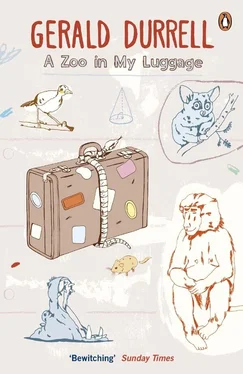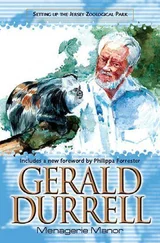Gerald Durrell - A Zoo in My Luggage
Здесь есть возможность читать онлайн «Gerald Durrell - A Zoo in My Luggage» весь текст электронной книги совершенно бесплатно (целиком полную версию без сокращений). В некоторых случаях можно слушать аудио, скачать через торрент в формате fb2 и присутствует краткое содержание. Жанр: Природа и животные, на английском языке. Описание произведения, (предисловие) а так же отзывы посетителей доступны на портале библиотеки ЛибКат.
- Название:A Zoo in My Luggage
- Автор:
- Жанр:
- Год:неизвестен
- ISBN:нет данных
- Рейтинг книги:4 / 5. Голосов: 1
-
Избранное:Добавить в избранное
- Отзывы:
-
Ваша оценка:
- 80
- 1
- 2
- 3
- 4
- 5
A Zoo in My Luggage: краткое содержание, описание и аннотация
Предлагаем к чтению аннотацию, описание, краткое содержание или предисловие (зависит от того, что написал сам автор книги «A Zoo in My Luggage»). Если вы не нашли необходимую информацию о книге — напишите в комментариях, мы постараемся отыскать её.
A Zoo in My Luggage — читать онлайн бесплатно полную книгу (весь текст) целиком
Ниже представлен текст книги, разбитый по страницам. Система сохранения места последней прочитанной страницы, позволяет с удобством читать онлайн бесплатно книгу «A Zoo in My Luggage», без необходимости каждый раз заново искать на чём Вы остановились. Поставьте закладку, и сможете в любой момент перейти на страницу, на которой закончили чтение.
Интервал:
Закладка:
‘All right. When will you go?’ asked Jacquie.
‘Tomorrow, if I can arrange carriers. Give Bob a shout and tell him we’re really going into the forest at last. Tell him to sort out his snake-catching equipment.’
Early the next morning, when the air was still comparatively cool, eight Africans appeared outside John Henderson’s house, and, after the usual bickering as to who should carry what, they loaded our bundles of equipment on to their woolly heads and we set off for Eshobi. Having crossed the river, our little cavalcade made its way across the grassfield, where our abortive python hunt occurred, and on the opposite side we plunged into the mysterious forest. The Eshobi path lay twisting and turning through the trees in a series of intricate convolutions that would have horrified a Roman road-builder. Sometimes it doubled back on itself to avoid a huge rock, or a fallen tree, and at other times it ran as straight as a rod through all such obstacles, so that our carriers were forced to stop and form a human chain to lift the loads over a tree trunk, or lower them down a small cliff.
I had warned Bob that we would see little, if any, wild life on the way, but this did not prevent him from attacking every rotten tree trunk we passed, in the hopes of unearthing some rare beast from inside it. I am so tired of hearing and reading about the dangerous and evil tropical forest, teeming with wild beasts. In the first place it is about as dangerous as the New Forest in midsummer, and in the second place it does not teem with wild life; every bush is not aquiver with some savage creature waiting to pounce. The animals are there, of course, but they very sensibly keep out of your way. I defy anyone to walk through the forest to Eshobi, and, at the end of it, be able to count on the fingers of both hands the ‘wild beasts’ he has seen. How I wish these descriptions were true. How I wish that every bush did contain some ‘savage denizen of the forest’ lurking in ambush. A collector’s job would be so much easier.
The only wild creatures at all common along the Eshobi path were butterflies, and these, obviously not having read the right books, showed a strong disinclination to attack us. Whenever the path dipped into a small valley, a tiny stream would lie at the bottom, and on the damp, shady banks alongside the clear waters the butterflies would be sitting in groups, their wings opening and closing slowly, so that from a distance areas of the stream banks took on an opalescent quality, changing from flame red to white, from sky blue to mauve and purple, as the insects – in a sort of trance – seemed to be applauding the cool shade with their wings. The brown, muscular legs of the carriers would tramp through them unseeingly, and suddenly we would be waist-high in a swirling merry-go-round of colour as the butterflies dipped and wheeled around us and then, when we had passed, settled again on the dark soil which was as rich and moist as a fruit cake, and just as fragrant.
One vast and ancient tree marked the half-way point on the Eshobi road, a tree so tangled in a web of lianas as to be almost invisible. This was a resting place, and the carriers, grunting and exhaling their breath sharply through their front teeth in a sort of exhausted whistle, lowered their loads to the ground and squatted beside them, the sweat glistening on their bodies. I handed round cigarettes and we sat and enjoyed them quietly: in the dim, cathedral-like gloom of the forest there was no breeze, and the smoke rose in straight, swaying blue columns into the air. The only sounds were the incessant, circular-saw songs of the great green cicadas clinging to every tree, and, in the distance, the drunken honking of a flock of hornbills.
As we smoked we watched some of the little brown forest skinks hunting among the roots of the trees around us. These little lizards always looked neat and shining, as though they had been cast in chocolate and had just that second stepped out of the mould, gleaming and immaculate. They moved slowly and deliberately, as if they were afraid of getting their beautiful skins dirty. They peered from side to side with bright eyes as they slid through their world of brown, dead leaves, forests of tiny toadstools and lawns of moss that padded the stones like a carpet. Their prey was the immense population of tiny creatures that inhabited the forest floor, the small black beetles hurrying along like undertakers late for a funeral, the slow, smooth-sliding slugs, weaving a silver filigree of slime over the leaves, and the small, nut-brown crickets who squatted in the shadows waving their immensely long antennae to and fro, like amateur fishermen on the banks of a stream.
Among the dark, damp hollows between the buttress roots of the great tree under which we sat there were small clusters of an insect which had never failed to fascinate me. They looked like a small daddy-longlegs in repose, but with opaque, misty-white wings. They sat there in groups of about ten, trembling their wings gently, and moving their fragile legs up and down like restive horses. When disturbed they all took to the air and started a combined operation which was quite extraordinary to watch. They rose about eight inches above the ground, formed a circle in an area that could be covered by a saucer and then began to fly round and round very rapidly, some going up and over, as it were, while the others swept round and round like a wheel. The effect from a distance was rather weird, for they resembled a whirling ball of shimmering misty white, changing its shape slightly at intervals, but always maintaining exactly the same position in the air. They flew so fast, and their bodies were so slender, that all you could see was this shimmer of frosty wings. I am afraid that this aerial display intrigued me so much that I used to go out of my way, when walking in the forest, to find groups of these insects and disturb them so that they would dance for me.
Eventually we reached Eshobi at mid-day, and I found it had changed little from the days when I had been there eight years before. There was still the same straggle of dusty thatched huts in two uneven rows, with a wide area of dusty path lying between them that served as the village high street, a playground for children and dogs and a scratching ground for the scrawny fowls. Elias came waddling down this path to greet us, picking his way carefully through the sprawling mass of babies and livestock, followed by a small boy carrying two large green coconuts on his head.
‘Welcome, Masa, you done come?’ he called huskily.
‘Iseeya, Elias,’ I replied.
He grinned at us delightedly, as the carriers, still grunting and whistling, deposited our equipment all over the village street.
‘Masa go drink dis coconut?’ Elias asked hopefully, waving his machete about.
‘Yes, we like um too much,’ I said, regarding the huge nuts thirstily.
Elias bustled into activity. From the nearest hut were brought two dilapidated chairs, and Bob and I were seated in a small patch of shade in the centre of the village street, surrounded by a crowd of politely silent but deeply fascinated Eshobites. With quick, accurate strokes of his machete Elias stripped away the thick husk from the coconut. When the tips of the nuts were exposed he gave each of them a swift slice with the end of his machete-blade, and then handed them to us, each neatly trepanned so that we could drink the cool, sweet juice inside. In each nut there was about two and a half glassfuls of this thirst-quenching, hygienically sealed nectar, and we savoured every mouthful.
After the rest, our next job was to get the camp in order. Two hundred yards from the village there was a small stream, and on its banks we chose an area that would not be too difficult to clear. A group of men armed with machetes set to work to cut down all the small bushes and saplings, while another group followed behind with short-handled, broad-bladed hoes, in an effort to level the red earth. At length, after the usual African uproar of insults, accusations of stupidity, sit-down strikes and minor brawls, the area had been worked over so that it resembled a badly ploughed field, and we could get the tents up. While a meal was being prepared we went down to the stream and washed the dirt and sweat from our bodies in the icy waters, watching the pink-and-brown crabs waving their pincers to us from among the rocks, and feeling the tiny, brilliant blue-and-red fish nibbling gently at our feet. We wended our way back to camp, feeling refreshed, and found some sort of organization reigning. When we had eaten, Elias came and squatted in the shade of our lean-to tent, and we discussed hunting plans.
Читать дальшеИнтервал:
Закладка:
Похожие книги на «A Zoo in My Luggage»
Представляем Вашему вниманию похожие книги на «A Zoo in My Luggage» списком для выбора. Мы отобрали схожую по названию и смыслу литературу в надежде предоставить читателям больше вариантов отыскать новые, интересные, ещё непрочитанные произведения.
Обсуждение, отзывы о книге «A Zoo in My Luggage» и просто собственные мнения читателей. Оставьте ваши комментарии, напишите, что Вы думаете о произведении, его смысле или главных героях. Укажите что конкретно понравилось, а что нет, и почему Вы так считаете.










